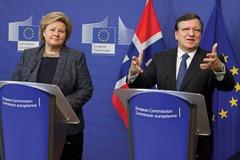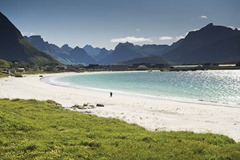Life outside the EU
 Norway’s status outside the European Union is generating more interest as the UK membership debate continues. Niels Engelschiøn, its Deputy Ambassador to the EU, talks to Peter Cheney about how his country interacts with Brussels.
Norway’s status outside the European Union is generating more interest as the UK membership debate continues. Niels Engelschiøn, its Deputy Ambassador to the EU, talks to Peter Cheney about how his country interacts with Brussels.
At the same time that the UK and Ireland were joining the European Economic Community in 1973, Norway was moving in a different direction. The Norwegian Government applied to join the EU in the 1960s but a small majority of voters opposed membership in a referendum in September 1972. That decision was reaffirmed in a referendum in November 1994 and there appears to be no change on the horizon. Opinion polls over the last three years have indicated that around 70 per cent of Norwegians support the status quo.
Norway’s prosperity has led many British Euro-sceptics to look favourably on its place outside the EU. The country has a higher GDP per capita than the UK but its oil and gas wealth is shared out within a smaller population: 5 million compared to 62 million. It is also, importantly, a member of the European Economic Area (EEA) which ensures that Norway is included in the single market.
As Norway’s Deputy Ambassador to the EU, Niels Engelschiøn has a detailed understanding of how his country interacts with the rest of Europe; he is also its Ambassador to Belgium.
Speaking personally, Engelschiøn notes: “Having an economy that is as strong as we have now in Norway and having looked at the very difficult situation there has been in Europe – at least since 2008 – I think that most Norwegians feel: ‘Why should we be a member?’”
“You vote a little bit with your wallet in that sense,” he quips.
It is harder to pin down the longer term reasons for staying outside the EU.
For many years before the economic downturn, public opinion was divided almost evenly on the question of membership. “It means we’re not that different,” Engelschiøn adds. “A lot of countries have had that 48:52 percentage division – Sweden, France, the Netherlands – when you had Maastricht and you had different referenda on European Union matters.”
A union is also “a difficult concept” for Norwegians. The country was joined with Denmark from 1524 to 1814 and then with Sweden for almost another century. It only gained its independence in 1905.
Engelschiøn comments: “I think the Norwegian is in many ways anti-establishment, strangely enough.” A strong Euro-sceptic alliance developed between a range of different voting groups – e.g. women, public sector employees, the left and religious conservatives – whose interests were generally linked to agriculture and fisheries.
“Although you were not a farmer yourself, you had a family member who was a farmer or you knew somebody who was a farmer,” he remarks. “So in those two referenda in ‘72 and ‘94, that strong alliance was anti-establishment and strong enough to be a small majority.”
It is put to him that this would appear to be a very wide alliance. “It’s nothing formalised,” he replies but those groups were highly represented among ‘no’ voters. By comparison, voters who tended to favour membership tended to be males aged between 30 and 60.
Religion also had an historic influence on voting patterns. Most Norwegians are Protestant and, in the 1970s, they were wary of joining what was then a mainly Catholic EEC. The loss of sovereignty which EU membership involves was “underlying everything” and that argument is found in all European countries.
Norwegian diplomats take part “when the decisions are shaped” in the EU’s expert committees but once the Commission has drafted a proposal, Norway formally leaves the law-making process. The draft law then goes through the European Parliament and the Council of Ministers before being finalised.
“With huge directives or regulations, that end result can be very different from when we participated in the expert committees,” he notes.
“The more we manage to get in at the earliest stage possible, the better,” Engelschiøn explains. “We need to find alliance partners and so on but the day the Commission gives the proposed text to Parliament and Council, [our influence] is limited, it must be said.”
To make further changes after that point, Norway has to gain the support of the Parliament and EU member states. Most of the time this is not a problem as it broadly shares the same interests, values and culture as the rest of Europe. For example, it concurred with the EU’s sanctions against Russia after the occupation of Crimea.
“When there are differences, when there is a particular Norwegian interest, it does demand a lot of work,” he comments. “You can call it lobbying in a sense towards the member states and Parliament and also partly the Commission.”
Norway has to be “realistic on what we can achieve” when the end result is ultimately a compromise between 28 member states and 751 MEPs.
Energy is one area where Norway’s interests tend to differ from other European countries as it is a net exporter: “You have challenges in that sense but we’re part of the same market so we need each other.”
Economics
The EEA Agreement allows for the free movement of goods, people, services and capital between Norway and the other member states. A surveillance authority ensures that Norway follows its obligations under the agreement and can take infringements to court.
While Norway is outside the EU, it has to pay its way to enjoy the privileges of European programmes. This contribution added up to €290 million in 2013. In addition, it provides €347 million per year to the EEA and Norway Grants which support social and economic development projects in Eastern and Southern Europe.
 One of the major local implications of a UK withdrawal would be that Northern Ireland would have one of the external borders of the European Union. Norway’s long border with Sweden and Finland presents a similar situation.
One of the major local implications of a UK withdrawal would be that Northern Ireland would have one of the external borders of the European Union. Norway’s long border with Sweden and Finland presents a similar situation.
These have been “very open borders” since the Nordic Passport Union was established in 1958. Norway is also part of the Schengen zone, which allows for a common travel visa for much of continental Europe. Both areas are akin to the Common Travel Area, covering the British Isles.
Norway, as mentioned, is part of the internal market but it does sit outside the customs union.
Goods have to be stamped before they cross the border with Sweden and Finland. “It’s fairly streamlined and a fairly easy border,” he remarks. Cross-border committees are used to resolve minor disputes between the countries.
The last customs checks between Northern Ireland and the Republic were abolished in 1993.
While Norway remains outside the EU, it still recognises its importance by keeping up regular high level contacts. Its diplomatic mission has around 50 staff located at Norway House, right beside the Commission’s headquarters.
Two specific structures – the EEA Council and EEA Joint Parliamentary Committee – bring together ministers and parliamentarians from the EU, Norway and the area’s other two external members: Iceland and Liechtenstein.
At the time of the interview, the European Council was taking place. Norwegian Prime Minister Erna Solberg is unable to attend this meeting – as it’s only open to EU leaders. However, she was also visiting Brussels for meetings with Angela Merkel and other centre-right heads of government.
The attention that Norway gives to these links indicates that if the UK leaves the EU, it will have to work hard at maintaining a good relationship with the rest of Europe – and Northern Ireland will need to make sure that its voice is still heard as well.
How Norway voted (%)
| Year | Yes | No | Turnout |
| 1972 | 46.5 | 53.5 | 78.2 |
| 1994 | 47.8 | 52.2 | 89.1 |
Source: Statistics Norway






